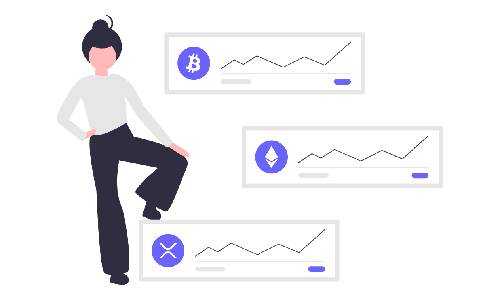To estimate the cost of building a website or an app, use our app cost calculator tool.
With greater trust, transparency, security, and instant traceability of transactions, blockchain technology is transforming the finance industry like never before.
Whether you are looking to improve operational efficiency, generate new revenue, lower capital requirements, or reduce risks in day-to-day operations, blockchain can be your go-to tool.
The statistics prove that the future of blockchain in Finance looks promising; thus, it is experiencing a high adoption rate. As a result, by 2026, blockchain's market size for banking and finance solutions is expected to reach a whopping figure of 22.5 billion USD.
Let’s read about the rising significance of blockchain and the new opportunities it brings to the finance sector.
Blockchain in Finance: Why There’s So Much Buzz?
Banking and finance companies across the globe are embracing blockchain. It uses distributed ledger and cryptographic hashing to record monetary transactions and asset tracking quickly and transparently.

Here are some more benefits of using blockchain technology in the finance sector.
1. Improved record-keeping
- Blockchain works on a distributed record-keeping mechanism called ledger. With blockchain, you can keep track of any modifications made to the information and assets within the chain.
- A blockchain solution offers an automated and low-cost system of record-keeping.
- Blockchain ensures only authorized users with user-specific encryption keys can access the records.
2. Instant payment settlements
- Imagine sending and receiving money across the globe almost instantly. Blockchain makes this a reality.
- Moreover, since blockchain transactions are super-fast – done in virtually seconds, it has the potential to transform payment settlements.
- Both parties save a significant amount of time and money.
- In addition, with this capability of blockchain, you do not need additional middle-office and back-office staff.
3. Refined contractual performance
- Blockchain solutions offer reliable digital business agreements in the form of smart contracts.
- A smart contract is “smart” because you can program it to self-execute and self-enforce agreements without involving any third party.
- It works on explicit terms and conditions that carry out contractual clauses with transactions.
- You can program your smart contracts to trigger the transfer of money and information under specified conditions.
- Decentralization in the blockchain system eliminates trust issues for contracts.
4. Other programmable capabilities
- Blockchain offers additional programmable capabilities to address data privacy, governance, compliance, and customer identity (KYC attributes).
- You can also manage stakeholder participation in multiple ways with blockchain.
5. Improved transparency
- Blockchain has the capability to make transactions transparent.
- A prominent feature of Blockchain is the immutability of stored data. So, for example, you can track financial transactions in real-time, leaving a clear audit trail.
- It stamps out persistent error handling and reconciliation.
- In addition, blockchain leads to improved regulatory reporting and monitoring.
6. Better processes
- Improved automation with Blockchain amplifies operational efficiency.
- You can considerably enhance processes of real-time settlement, audit and reporting, and error and delay management.
7. Reduced costs
- Speed, automation, and better error-handling trigger reduction in any infrastructure expenses, operation, and transaction expenses.
Exploring the Use Cases of Blockchain in the Finance Sector
Like many other emerging technologies, blockchain is breaking boundaries and offering excellent cross-industry solutions.
The finance sector, which faced challenges because of inefficient, traditional systems, has significantly benefited from the blockchain.

So here are a few exciting blockchain applications in finance that are gaining traction in the industry.
1. Identity Verification
Every bank account holder desires safety and security from cybercriminals.
While traditional banking systems did not offer fool-proof authentication and authorization, blockchain improves identity verification.
Blockchain secures the bank customer identification info, therefore ensuring banks gain trust and offer protection against fraud.
Besides, blockchain reduces the number of tedious steps for the identity verification of customers.
KYC is one such process where it is extremely helpful.
We all know that a typical customer onboarding process is quite time-consuming and expensive because it involves verification processes at different stages.
Blockchain addresses these challenges.
With blockchain hyper-ledger, customer databases are automatically updated with the most relevant info securely shared between loan officers and banks.
In short, the customer will need to undergo the KYC process only once, and the verification is stored on the blockchain for later use.
2. Cross-border transactions
Transferring money across borders has traditionally been a slow-paced and expensive process.
Besides, the banks charge an additional fee on every bank transaction. That’s because each transaction has to pass through multiple financial institutions on the way to the receiver.
Blockchain makes the entire process smoother, faster, more accurate, and cost-effective.
It allows customers to send and receive money quickly with minimal involvement of others.
3. Trading
Most financial trading activities typically involve a lot of paperwork – such as credits, bills, and invoices. Besides, the traditional trading system has many other pain points – delayed payment, manual contract creation, and delayed timeline.
Blockchain brings in a better trading experience for both buyers and sellers. For example,
- Transparent pricing
- New alternative markets
- Faster payments processing
- Immutable record maintenance of transactions
- Real-time updating
4. Managing credit scores
Most financial institutions, including banks, verify the applicant's credit score whenever they receive a loan application.
However, a limitation of the traditional credit management system is the credit scores’ lack of mobility. Because of this, the current credit rating of a person may be considered invalid in different countries. That’s why a blockchain-powered universal credit rating is required.
Managing credit scores with blockchain technology indeed brings transparency to the entire system.
Blockchain facilitates lenders to access the immutable records of financial transactions. They can, thus, check the creditworthiness of a loan applicant.
5. Funds investment
Investing in funds is a time-consuming process.
Blockchain users’ personal, legal, and other information are easily stored with an immutable smart contract. It can then:
- Lower the possibility of errors and fraud
- Bring in transparency
- Make data access easy and authenticated.
How Will Blockchain Revolutionize the Finance Sector
The potential of blockchain solutions in financial services is massive. Its applications that span payments, trade, investment, capital markets, wealth management, and more address many financial institutions’ challenges.
Let's check how blockchain technology stands to solve the challenges of the finance sector and revolutionize it.
1. Superior Auditing Procedure
Industry experts consider blockchain a game-changer for audit processes.
The present auditing system is entirely centralized. There is no transparency. And, there are many time-consuming and labor-intensive processes for manual data extraction and audit preparation. Because of such time-consuming activities, there is a lag between the transaction and verification dates.
Hence, accountants and other compliance officials take the liberty to show specific pieces of information at the time of audits. This leads to unethical behavior, dishonesty, irregular compliance, and a long auditing period.
Blockchain solution:
Implementing blockchain in the auditing process of your company is the best solution in such a case.
Since blockchain records are immutable, the auditors can check them for meeting the compliances correctly.
Moreover, increased transparency with blockchain support will ensure that financial service providers follow ethical work processes.
You will be able to track all suspicious transaction activities easily. Moreover, with ease in information availability, there will be a reduction of time needed for auditing procedures.
Therefore, Blockchain in finance makes way for better auditing.
2. Enhanced security and transparency
The traditional systems that many financial services follow lack transparency and security. One of the core reasons for it is their use of centralized databases.
Another reason is that they are multi-layered, which means that the financial data stored by such companies go through various points, such as back-office or front-office, etc.
Blockchain solution:
Removes Intermediaries: A blockchain-powered solution ensures that financial transactions happen only between concerned parties entering into a bilateral agreement. With the result, you don't need any intermediaries and mediators for the payments processing.
That's a great way to ensure trust.
Transparency: Since blockchain is a distributed ledger technology, it has multiple nodes. All these nodes maintain the same copy of account balances. Transaction records and data are held identically at different locations.
Security: Blockchain creates a record that's hashed and encrypted. Thus, unauthorized data access and modification aren’t possible.
3. Costs reduction
If used wisely, blockchain can be a great tool to cut costs.
Most companies in the finance sector follow a centralized approach. These companies invest a lot of money in:
- Purchasing and maintaining central databases
- Bookkeeping
- Staffing costs
- Database security
- Commissions by intermediaries
Most of these costs are recurring, which means companies invest in them at regular intervals. All this makes the entire system more expensive without guaranteeing that data breaches will no longer occur.
Blockchain solution:
Blockchain-enabled solutions are excellent tools for financial companies to cut costs.
They reduce the need for any manual intervention in altering and sharing data.
For example, regulatory reports and audit documents become easy to access with blockchain, requiring minimal manual processing. As a result, employees can focus exclusively on other value-added activities.
Similarly, post-trade reconciliation and monetary settlement are examples of some time-consuming and expensive processes of financial institutions.
Blockchain can completely revolutionize these processes and make them automated, super-fast, and cost-effective.
Moreover, financial institutions can store a commonly shared digital representation of asset holdings with blockchain, thus making a central database unnecessary.
Blockchain smart contracts can reduce the costs of intermediaries, the operational cost of bookkeeping, and value transfers.
4. Efficient Assets Management
The security and resiliency of transactional data are essential for assets management. However, with a centralized database and multiple transaction channels, they are often difficult to achieve.
Blockchain solution:
Blockchain technology interventions are primarily valuable for processes that are complex and time-consuming.
The distributed ledger concept of blockchain facilitates direct cross-border trading and settlements.
What's more, you can count on further benefits such as cost reduction, increased data accuracy, and fewer delays in processes. That way, your assets management processes will no longer be vulnerable to errors and fraud.
Blockchain creates a system consisting of third-party service providers and internal systems supported by the technology.
This whole system revolves around a single source of truth for asset management activities in your company. Such a blockchain intervention will make adding new partners easier for you while managing all transactions by the blockchain.
5. Effective Risks Control
Financial institutions face many risks in providing certain services, such as loans.
The risks include situations like counterparty unable to meet its obligations, credit risks because of information asymmetry, or when it is about trusting intermediaries.
Service providers are almost always at risk of facing substantial expenses if something goes wrong.
Blockchain solution:
With a blockchain solution, you can treat every stakeholder as a node. This is how such a solution resolves risks.
- Blockchain-based P2P – peer-to-peer transactions remove the need for any intermediaries.
- Fund management and credit risks are reduced.
- In addition, automated smart contracts settle transactions quickly.
Develop Blockchain-Based Finance Platform with Imaginovation
Blockchain in Finance has opened up new avenues for financial companies proactively looking to adopt this technology.
With blockchain-based interventions, you can tap into new and unexplored markets, reduce the operational costs of your business, improve cyber-security, control risks, and do away with inefficiencies associated with the traditional payment system.
To know more about it, contact us at Imaginovation.
Imaginovation is an award-winning web and mobile app development company with vast experience crafting remarkable digital success stories for diverse companies.
We will help you develop a blockchain-based finance platform for your business that'll help you build trust, bring transparency, and cut down unnecessary costs. Let's talk.











